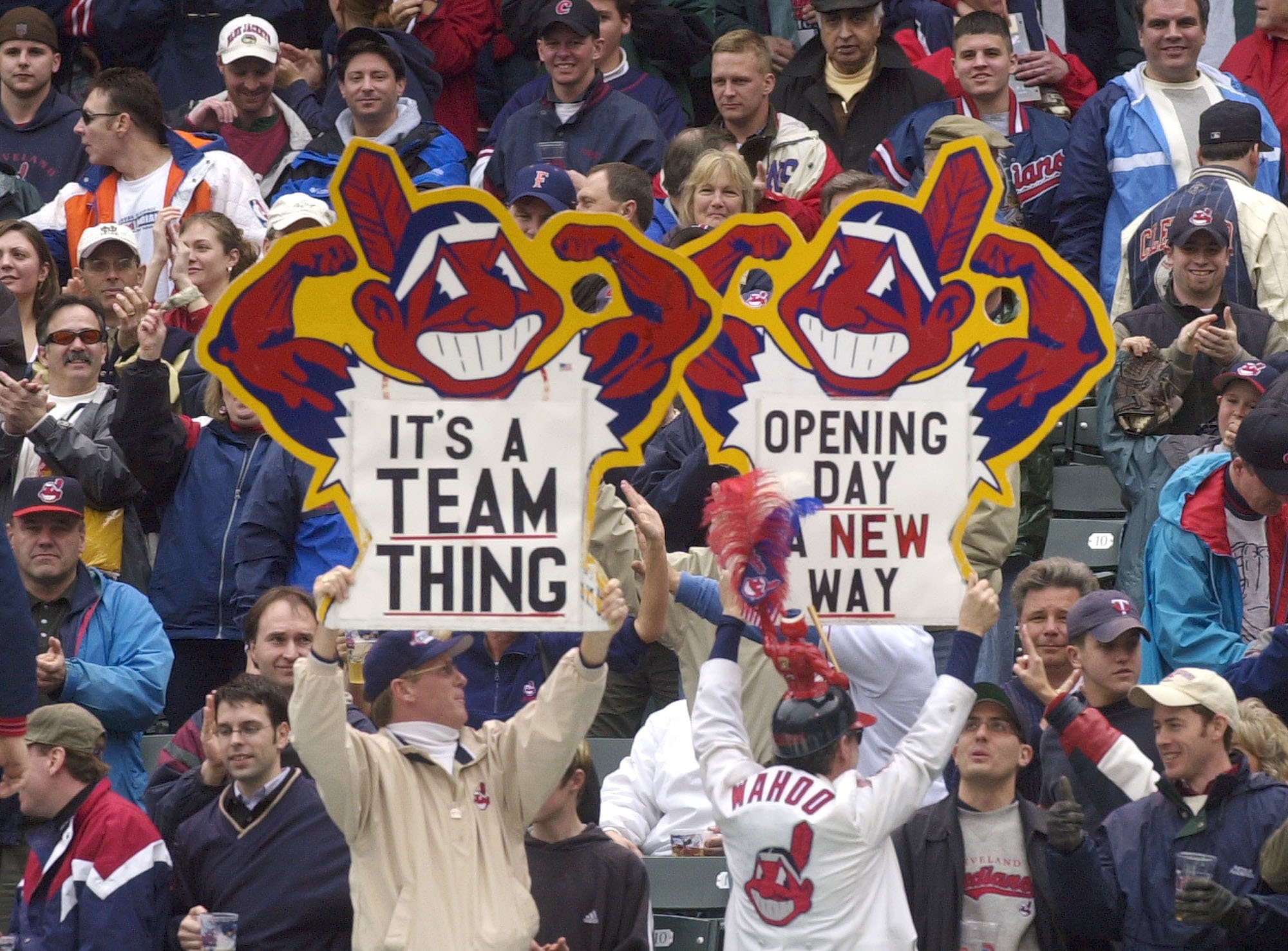How racist is the Cleveland Indians' mascot? Very.
If you made him swarthy and swapped a yarmulke for his feather, "Chief Wahoo" would be right at home in a Nazi pamphlet


A free daily email with the biggest news stories of the day – and the best features from TheWeek.com
You are now subscribed
Your newsletter sign-up was successful
Baseball is, at the end of the day, baseball. A game. A lark. A pastime. Except that nothing is "just" anything, and all of culture is closely tied to the people around us and the politics of our lives. As the saying goes: The personal is political. Even baseball. Even during the World Series.
Full disclosure: I'm a ride-or-die Cubs fan; there's nothing I'd like more than to see them sweep the Cleveland Indians this weekend, winning the World Series for the first time in over a century in Wrigley Field. (Fuller disclosure: If this happens, your reporter will lose her mind). So I get what Cleveland fans are going through — the excitement, the angst, the families gathered with literal tears in their eyes.
But we need to talk about "Chief Wahoo."
The Week
Escape your echo chamber. Get the facts behind the news, plus analysis from multiple perspectives.

Sign up for The Week's Free Newsletters
From our morning news briefing to a weekly Good News Newsletter, get the best of The Week delivered directly to your inbox.
From our morning news briefing to a weekly Good News Newsletter, get the best of The Week delivered directly to your inbox.
How troubling is the Indians' mascot? Let's imagine for a moment that the team was named after some other long-maligned, long-oppressed group. I don't know, let's say the Jews? Imagine the swarthy, hook-nosed face of Ol' Hymie on the players' caps. And hey, if fans want to use Jewish prayer shawls for rally towels, it's just good fun. Go Heebs!
Too far? The Cleveland Indians' Chief Wahoo is a garishly red (get it? 'Cause Indians are red?), be-feathered cartoon, all big nose and step-n-fetch-it grin. If you made him swarthy and swapped a yarmulke for his feather, Wahoo would be right at home in a Nazi pamphlet. He is, in a word, racist. The Chief doesn't ipso facto turn Cleveland fans into racists, but Native American activists have been calling for years on those fans to acknowledge and remove the blatant racism with which their fandom is saddled.
Cleveland is not, of course, the only offender. Down the street from my cuddly Cubs are the Chicago Blackhawks, and while the hockey franchise's Indian-in-profile mascot isn't buffoonish, he sure is a wrongly-appropriated Native American image. The country is littered with similarly named high school and college teams (Apaches, Scouts, Tomahawks); in 2002, a predominantly Native American college basketball team responded to a local high school's "Reds" by naming themselves the "Fightin' Whities" — a move that was (surprise!) controversial. And then of course there's the NFL's Washington "Redskins," a name so racist, even the dictionary calls it "contemptuous."
How did we get to this sorry state of affairs? Here's an excruciatingly brief recap: Comprising a complex civilization still not reflected in most history books, North America's inhabitants were invaded by strangers bearing both disease and notions of racial superiority — whole communities were decimated by rampant plagues even before organized slaughter began. The survivors were ultimately forced onto reservations, their children taken away to boarding schools, where their names were forcibly changed and their languages ripped from their throats — in order to "kill the Indian, save the man."
A free daily email with the biggest news stories of the day – and the best features from TheWeek.com
To add insult to literal injury, popular imagination now relegates the Native experience to a dead, largely invented, past: Noble Savages forever crossing the plains in a timeless, context-less journey — not real people, at least half of whom live today in urban settings.
Not 21st century men and women working to revive languages and synthesize ancient traditions; not Medal of Freedom recipients, military heroes, or politicians. Not actors, comedians, ballerinas, and certainly not activists trying to stop the Dakota Access Pipeline.
Even as the world learned this week of more than 200 total arrests in the ongoing oil pipeline protest, yet darker news was breaking: An In These Times investigative report found that "Natives [are] more likely to be killed by police than any other group, including African Americans" — a data point that joins other heartrending data points: suicide rates close to double that of any other group, labor force participation rates lower than anyone else, and 2.5 times the rates of sexual assault and rape, most of the sexual violence perpetrated by white people.
The appropriation of Indian imagery first took off in the early 20th century, just as the U.S. government was working overtime to extinguish Native cultures altogether. As Kevin Gover, director of the National Museum of the American Indian and a citizen of the Pawnee tribe, told USA Today: "It is an expression of the idea: 'We, the white people, won — and we can do anything with you and your imagery and your identity that we choose to do.'"
Some fans of teams with offensive iconography have vocally opposed any changes, confronting Native protesters or showing up on game day in red-face; others have taken a more respectful approach — as Chicago-based hockey columnist Jay Zawaski tweeted on Wednesday night: "I could not care less if the [Blackhawks] get rid of the logo. It's just a picture. My memories aren't tied to a cartoon," adding, "It is an offensive representation to many people."
Sports fans' opinions aside, as Native institutions and activists have made crystal clear, these mascots and team names are part of much broader, systemic dehumanization, the consequences of which continue to be literally deadly for Native Americans.
In response to growing anti-Wahoo protests, baseball commissioner Rob Manfred is reportedly discussing "what should happen" with the mascot. I can only hope these discussions will include the actual people fighting for their cultural dignity, and prove the start of genuine efforts to dismantle a deeply shameful part of American culture.
But shedding mascots and names can only ever be that: A start. Native Americans continue to wait for a great deal more justice to be done.
Emily L. Hauser is a long-time commentary writer. Her work has appeared in a variety of outlets, including The Daily Beast, Haaretz, The Forward, Chicago Tribune, and The Dallas Morning News, where she has looked at a wide range of topics, from helmet laws to forgetfulness to the Israeli-Palestinian conflict.
